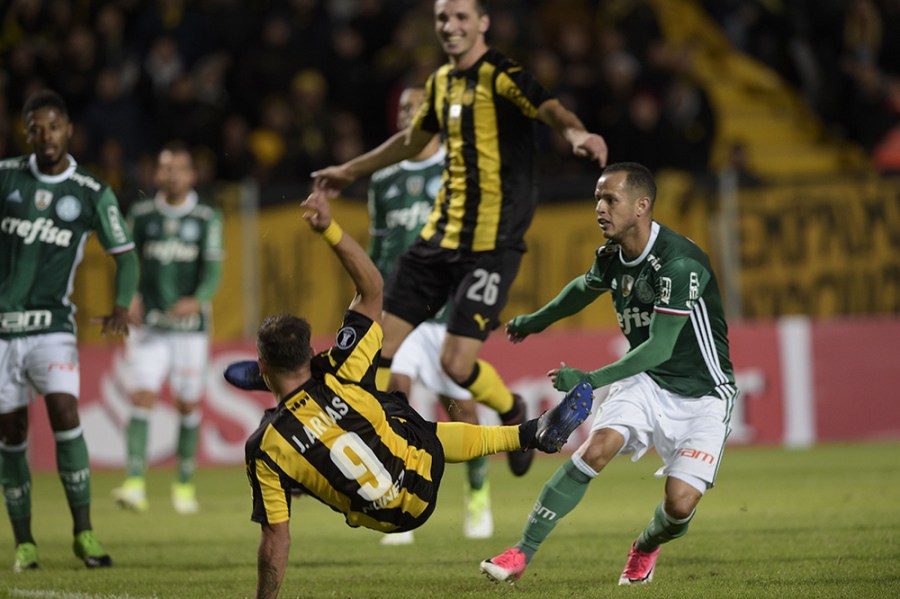In a new venue there was an old problem last week as the Penarol v Palmeiras game descended into the type of punch-up that gives the Libertadores Cup a bad name.
It always looked like a high risk encounter. Their first meeting, two weeks earlier, had prepared the ground. On home soil in Sao Paulo, Brazilian champions Palmeiras came from behind to beat their Uruguayan opponents 3-2 – the clinching goal coming in the ninth minute of stoppage time. Penarol had done their best to run the clock down, but were aggrieved at the amount of additional time the referee had put on. Felipe Melo, the fiery Palmeiras midfielder, claimed that he had been racially abused during the match. With Penarol desperate for points in the rematch, the atmosphere was bound to be tense. Palmeiras took extra security staff with them when they travelled down to Montevideo – and ended up very pleased with their decision.
The match took place in Penarol’s Campeon del Siglo stadium inaugurated just over a year ago. The home fans were certainly happy with the first half. Palmeiras coach Eduardo Baptista went with a three centre back system that made little sense. The players clearly did not believe in the tactics, and the first half formation looked something like a 9-0-1, with centre forward Miguel Borja hopelessly isolated. Penarol, with one of the worst teams in the club’s glorious history, were made to look like Di Stefano’s Real Madrid. They led 2-0, and it could have been more. Palmeiras had not mounted a serious attack.
At the interval Baptista did the obvious, correcting his mistake and reverting to a 4-3-3. From the restart it was a different game. The Brazilians scored three times in under half an hour, and then survived a late Penarol rally to win 3-2.
The result leaves the Uruguayans on the verge of elimination, needing to win their last two games and hoping that other results go in their favour. This was not a situation likely to bring out the best in them.
The final whistle was greeted by a brawl. Felipe Melo certainly threw punches – he may even have been the first to throw. But he was being pursued by a Penarol posse. Alarmingly, the players could not initially got off the field and back to the dressing room. The gate was still closed. They were an open target. The violence spread to the stands, with clashes between both sets of supporters, and continued with skirmishes down in the tunnel once the gate was open. Palmeiras later claimed that without their extra security staff a tragedy could have taken place.
CONMEBOL has announced some provisional three-game suspensions pending a further inquiry. One of them was handed to Felipe Melo – who runs the risk of being a prisoner of his own ‘hard man’ caricature. The others went to Penarol players – midfielder Nahitan Nandez, the captain, left-back Lucas Hernandez and substitute midfielder Matias Mier. This seems a fair assessment of where the blame lies – and as Palmeiras director Alexandre Mattos pointed out after the game, it was all very predictable.
The paradox here is that Uruguay is a strong candidate to be the most civilised country in South America. Football, though, has the power to bring to the surface a wild lack of control – which can only be understood by context.
“Other countries have their history,” said Ondino Viera, a legendary coach who took the national team to the 1966 World Cup. “Uruguay has its football.” One hundred and twenty years ago, no one could have predicted that this obscure little country, essentially a buffer state between Brazil and Argentina, would soon become the leading power in the global game. Football gave self-esteem and identity to a land largely populated by recent immigrants from Italy and Spain. Penarol were the first ever champions of the Libertadores back in 1960. They successfully defended their crown a year later – against Palmeiras. They have five titles in all – but the last was in 1987. Since then, with the exception of an appearance in the 2011 final, they have never been further than the quarter finals.
The very first game in the history of the Libertadores was Penarol’s 7-1 win over Jorge Wilstermann of Bolivia in April 1960. When they met two months ago in the opening week of this year’s tournament, the Bolivians won 6-2. Losing like this is not just a sporting humiliation. It seems like the death of a birthright.







